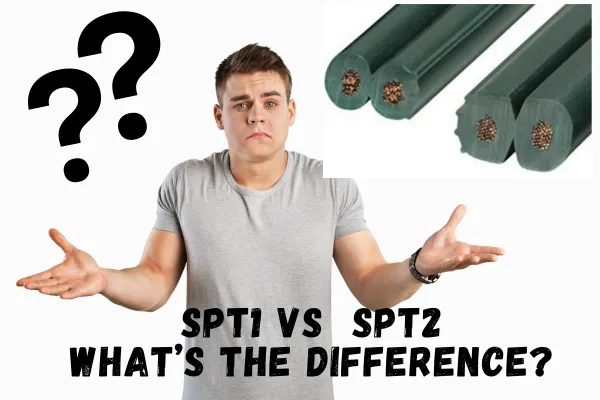Podcast

What Is the Difference Between SPT-1 and Spt-2?
Is it true that you believe the difference between SPT-1 and SPT-2 is negligible? Let's take a closer look. These terms refer to the thickness of the insulation on your Christmas light cords, with SPT-1 being the standard and SPT-2 providing a thicker layer. You might think thicker insulation means better, but it's not that simple. It's the copper inside that determines the current capacity. So, why should you care about these details? Well, knowing the difference can make your holiday display not only more outstanding, but also safer and more efficient. But the question remains, how exactly does this work?

Understanding SPT-1 and SPT-2 Differences
When it comes to understanding the differences between SPT-1 and SPT-2, it's essential to note that these labels primarily indicate the thickness and durability of the insulation used in these commonly preferred cords for C7 and C9 Christmas bulbs.
In terms of insulation thickness, SPT-1 is your standard option. It's the typical choice for most residential and some commercial applications. But if you're dealing with high-traffic environments or locations where the cords might suffer extensive wear and tear, SPT-2 is your go-to. Its insulation is significantly thicker, offering more durability and longevity.
On the subject of durability comparison, SPT-2 outshines SPT-1. Its greater thickness allows it to resist damage better, making it ideal for commercial applications where cords can be exposed to harsh conditions. So, if you're setting up a commercial Christmas display, you'll find SPT-2 to be a more reliable choice.
Wire color options are plentiful for both types of cord. You can find them in white, green, and brown, allowing you to match your cords to your decor effortlessly. However, do note that not all colors may be available in both SPT-1 and SPT-2.
Exploring SPT-2 Cord Benefits
Delving into the benefits of SPT-2 cords, you'll find they offer a level of durability and versatility that's hard to beat. The enhanced durability of SPT-2 cords is a standout feature, providing a thicker insulation that can withstand harsh conditions, making it a favorite for commercial installations.
One of the primary advantages you'll appreciate with SPT-2 cords is their increased availability. They've become a common fixture in the market, providing you with a wide range of options when it comes to wire colors and socket spacings. This makes finding the right cord for your project not just possible, but easy.
What's more, you have the freedom to cut these cords to custom lengths. Whether you're working on a small home project or a larger commercial installation, you can adjust the SPT-2 cords to suit your specific needs. They're designed to adapt, proving their versatility in a variety of settings.
Moreover, safety compliance is a high priority when dealing with electrical cords, and SPT-2 doesn't disappoint. The thicker insulation not only contributes to their longevity but also ensures adherence to safety standards. This makes them a reliable choice for commercial installations where safety compliance is non-negotiable.

Debunking Current Rating Myths
While you appreciate the durability and versatility of SPT-2 cords, it's important to clear up some common misconceptions about their current rating. You might think that the thicker insulation on SPT-2 means it has a higher current capacity, but that's not the case. Regardless of the insulation thickness, both SPT-1 and SPT-2 cords have the same current capacity.
This brings us to the next point of misconceptions clarified - the current capacity is actually determined by the copper quality, not the thickness of the insulation. It's the copper that carries the current, not the insulation. Whether you're using an SPT-1 or an SPT-2, both can safely carry up to 10 amps of current, thanks to the quality of the copper used in their construction.
Now, you might ask, why bother with SPT-2 if the current capacity is the same? Well, the thicker insulation on the SPT-2 provides better durability and protection, especially for commercial applications. But remember, it doesn't mean it can carry more current.
Guide for Effective Wire Selection
Choosing the right wire for your project can significantly enhance both its effectiveness and safety. It's not just about picking any wire; you need to be mindful of the wire gauge, insulation thickness, voltage rating, and whether the wire is suitable for outdoor use.
Consider the wire gauge first. This refers to the wire's thickness; a lower number means a thicker wire. Thicker wires can carry more current without overheating, so if you're working on a high-power project, go for a wire with a lower gauge number.
Next, think about insulation thickness. SPT-1 and SPT-2 are differentiated mainly by this factor. SPT-2 has thicker insulation, making it more durable and better suited for heavy-duty applications.
The voltage rating is another crucial factor. Always choose a wire with a voltage rating that exceeds your project's maximum voltage. This precaution helps prevent electrical accidents.
If you're planning for outdoor use, make sure the wire is rated for it. Outdoor wires are designed to withstand weather conditions, enhancing the safety and longevity of your project.
Lastly, consider socket spacing. If you're working with lighting, the spacing between sockets can affect the brightness and coverage of your lights. Choose a wire with the right socket spacing to achieve the desired lighting effect.

The Need for Professional Consultation
When it comes to selecting the right wire for your project, it's crucial to seek the advice of a Master Electrician. Their expert guidance becomes invaluable considering the many variables that come into play, including safety assurance, installation expertise, compliance standards, and efficiency enhancement.
You may think that you've got it all figured out. After all, you've done your research on SPT-1 and SPT-2 wires. But, it's not just about knowing the difference between the two. There's more to it than meets the eye. Wiring involves more than just picking the right wire - it's also about ensuring that every part of your project aligns with safety and compliance standards.
That's where the installation expertise of a Master Electrician comes in. They have the experience and knowledge to ensure your project is carried out correctly and safely. They'll be able to identify any potential issues that could arise and help you select the best wire for your specific needs.
Moreover, relying on professional advice can also lead to efficiency enhancement. By making the right decisions from the start, you'll avoid unnecessary setbacks or costly mistakes. Your project will run more smoothly, saving you time and effort in the long run.

How Can You Physically Differentiate Between SPT-1 and SPT-2 Cords Upon Inspection?
You can differentiate between SPT-1 and SPT-2 cords by inspecting the insulation thickness. SPT-2 cords have thicker, more durable insulation. However, don't be fooled into thinking thicker means higher current capacity; both types can carry 10 amps. Always prioritize safety measures in any installation procedures. When in doubt, consult a professional to ensure you're using the right cord for your needs.
Can SPT-1 and SPT-2 Cords Be Used Interchangeably in the Same Installation?
You can interchange SPT-1 and SPT-2 cords in the same installation. However, consider cord durability and material composition. SPT-2's thicker insulation adds robustness, but both have the same power capacity. Always follow safety measures during the installation process. Even though they're interchangeable, it's not always the best practice. Consult with a professional to ensure you're making the safest, most efficient choice.
What Are the Potential Consequences of Using the Wrong SPT Cord for a Specific Application?
Using the wrong SPT cord for a specific application can lead to safety and durability issues. If a cord's insulation isn't up to industry standards, it may wear out faster, risking exposed wires. You could also exceed the cord's power capacity, causing it to overheat. Therefore, it's crucial to follow professional installation techniques and safety measures. Always match the right cord with the right application to ensure a safe and efficient system.
How Does the Cost of SPT-1 Cords Compare to SPT-2 Cords?
You're probably wondering how SPT-1 cords compare to SPT-2 in terms of cost. Generally, SPT-2 cords are pricier due to their thicker insulation, enhancing cord longevity and safety. However, despite the manufacturing differences, both are widely available in the market. It's important to factor in not just price, but also safety and durability when choosing between the two. Don't skimp on safety for a slight price difference!
Can SPT-1 and SPT-2 Cords Withstand Similar Environmental Conditions Such as Rain, Snow, and Heat?
Yes, both SPT-1 and SPT-2 cords can withstand similar environmental conditions like rain, snow, and heat. Their cord durability is high due to their material composition. Yet, SPT-2's thicker insulation makes it a bit more durable. Regardless, safety measures should always be followed when using these cords outdoors. Regular cord maintenance, including checking for damage and proper storage, will also prolong their lifespan. Always consult a professional for specific usage advice.

So, now you know the difference between SPT-1 and SPT-2. It's all about the thickness and durability of the insulation on your Christmas light cords. And remember, a higher SPT rating doesn't mean more current capacity. That's up to the copper inside. For your holiday display to be safe and efficient, choose your wires wisely. And don't hesitate to get advice from a Master Electrician when dealing with large spools or commercial installations. Your dazzling display depends on it!
Copyright ©2026 All Right Reserved website designed by christmaslights.io
Terms of Service / Privacy Policy
Have questions or need assistance?
Contact us at (855)619-LITE


